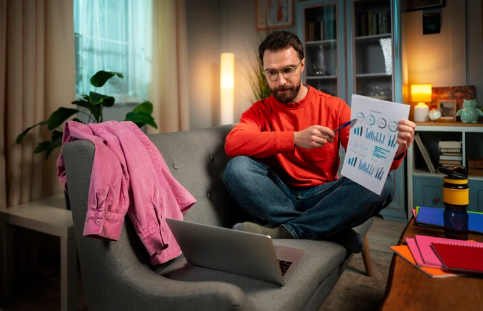NoBullSwipe Review: Can a Digital Declutter Truly Boost Your Life Quality?

The relentless pursuit of a higher quality of life is a universal human endeavor, yet in our hyper-connected digital age, the very tools promising convenience and connection have morphed into pervasive sources of distraction, anxiety, and chronic time poverty. The constant barrage of notifications, the infinite scroll of social media feeds, and the engineered compulsion to check our devices have fractured our attention spans, eroded our leisure time, and created a pervasive background hum of stress that makes genuine relaxation and deep focus increasingly rare commodities. This digital fragmentation directly opposes the core pillars of life quality: mental clarity, meaningful social connection, personal productivity, and the free time necessary to engage in enriching activities. In response, a movement towards digital minimalism has gained momentum, but many find the theory easier to understand than to practice. It is within this challenging landscape that a product like NoBullSwipe emerges, presenting itself not as another productivity app to manage your apps, but as a rigorous system and philosophical framework designed to facilitate a radical and permanent digital declutter. This in-depth review will analyze the NoBullSwipe methodology, examining its core principles, practical application, and the tangible psychological and lifestyle benefits it claims to deliver, to determine whether its aggressive approach to digital hygiene can genuinely catalyze a significant and lasting improvement in overall well-being.
The NoBullSwipe philosophy is built upon a foundation of conscious and intentional technology use, advocating for a ruthless audit of one’s digital environment to eliminate anything that does not provide substantial value or align with one’s personal and professional goals. The process likely begins with a comprehensive inventory of all digital subscriptions, app usage, and online habits, forcing a moment of stark clarity about where time and attention are actually being spent. This is followed by the implementation of its namesake action: the “swipe.” This isn’t merely deleting a few unused apps; it’s a systematic purge of time-sucking applications, unnecessary email subscriptions, toxic social media accounts, and any other digital content that promotes mindless consumption. The system probably provides a structured framework for this purge, offering criteria for what to keep, what to archive, and what to eliminate without remorse. Beyond the initial declutter, NoBullSwipe almost certainly promotes the establishment of strict digital boundaries, such as designated times for checking email and social media, the use of website blockers during deep work sessions, and the physical separation from devices during meals and personal time. The ultimate goal is to break the cycle of compulsive checking and reactive behavior, transforming the smartphone from a source of interruption into a deliberately curated tool that serves the user’s agenda, rather than the other way around. This reclamation of agency over one’s digital life is the critical first step in reversing the negative impacts of technology overload.
The profound benefits of successfully implementing a system like NoBullSwipe extend far beyond a cleaner phone homepage; they permeate every facet of daily existence, directly boosting overall life quality. The most immediate and noticeable impact is a significant enhancement of mental well-being; the reduction in notifications and social comparison creates a quieter mental space, leading to decreased anxiety, improved mood, and a greater capacity for mindfulness and presence in the offline world. This newfound mental clarity naturally begets a massive increase in productivity and deep work capabilities, as the brain is no longer constantly task-switching and can instead dedicate sustained focus to complex projects, leading to greater professional fulfillment and efficiency that actually creates more free time. Perhaps most importantly, this reclaimed time and cognitive resources can be reinvested into high-value activities that truly enrich life, such as nurturing real-world relationships, engaging in hobbies, reading, exercising, or simply resting without guilt. By deliberately choosing a less cluttered digital life, individuals make room for more meaningful experiences, reduced stress, and a greater sense of control over their time and attention, which are the true currencies of a high-quality life. NoBullSwipe, therefore, is not just a productivity system; it is a catalyst for a more intentional, focused, and ultimately more satisfying way of living.
Conclusion
In final analysis, NoBullSwipe presents a compelling and critically needed solution to one of the defining quality-of-life challenges of the modern era. Its value proposition—a structured, no-nonsense system for executing a radical digital declutter—addresses the root cause of digital anxiety rather than merely applying Band-Aid solutions. While the process requires honesty, discipline, and a willingness to confront uncomfortable truths about one’s digital habits, the potential rewards are transformative. The liberation from constant digital noise directly translates into enhanced mental peace, superior focus, reclaimed time, and a renewed capacity to engage in the analog experiences that truly make life worth living. For anyone feeling overwhelmed by their devices, perpetually busy yet unproductive, or simply yearning for a greater sense of control and intention in their daily routine, adopting the NoBullSwipe methodology is not merely a recommended experiment but a powerful investment in long-term well-being. It offers a practical path out of the digital fog and into a more conscious, deliberate, and high-quality life.
Frequently Asked Questions (FAQ)
Q1: What exactly is NoBullSwipe?
A: NoBullSwipe is a practical methodology and system designed to help individuals execute a radical digital declutter. It provides a framework for auditing your digital life, ruthlessly eliminating low-value apps and subscriptions, and establishing strict boundaries for technology use to reclaim focus and time.
Q2: How is this different from just turning off notifications?
A: Turning off notifications is a passive defense. NoBullSwipe is an active, offensive strategy. It’s about permanently removing the sources of distraction, not just quieting them. It involves deleting apps, unsubscribing from emails, and curating your digital environment to include only what serves you, creating a fundamental shift in your relationship with technology.
Q3: Will I miss out on important things if I delete social media and news apps?
A: The NoBullSwipe philosophy argues that the “fear of missing out” (FOMO) is precisely what these platforms exploit. The system encourages intentional consumption. Instead of endless scrolling, you can choose to check a specific news site once a day or interact with social media on a desktop at a scheduled time. This ensures you stay informed without being overwhelmed.
Q4: Is NoBullSwipe a paid app or program?
A: Based on its name and ethos, NoBullSwipe is likely a philosophy and a set of guidelines (e.g., a book, a course, or a website guide) rather than a subscription-based app. The core idea is to use fewer apps, not more. You should research the specific product offered by the “NoBullSwipe” brand.
Q5: How long does it take to see the benefits of a digital declutter?
A: The benefits can be felt almost immediately after the initial purge, as a sense of mental relief and reduced anxiety. However, the full benefits—like significantly improved focus, higher productivity, and the habit of not reaching for your phone compulsively—develop and compound over several weeks as you stick to your new digital boundaries.
Q6: Can this really improve my overall life quality?
A: Absolutely. By reclaiming your time and attention from digital distractions, you directly invest those resources into activities that genuinely improve your well-being: deeper work, richer relationships, better sleep, hobbies, and relaxation. Reducing digital overload is one of the most effective modern strategies for boosting mental health and life satisfaction.

